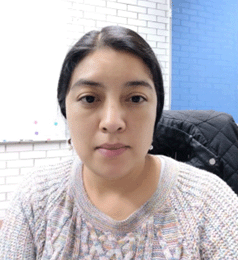Nanostructured substrates
Selene Rubí Islas-Sánchez
Dr. Selene Islas obtained her degree in Chemistry from the National Autonomous University of Mexico, UNAM in 2009. She earned a master´s and doctorate degree in Chemical Sciences from UNAM in 2012 and 2018, respectively. She recently joined the Institute for applied Sciences and Technology of the National Autonomous University of Mexico (UNAM) as Academic Associate. She is a member of the National Research System of Mexico. She specializes in molecular and vibrational spectroscopy, such as Raman, FTIR, Florescence and UV-visible absorption. Hers scientific interests lie in studies of molecule-substrate interaction, functionalization of nanostructures to attain new physical-chemical properties and the development of analytic platforms suitable for detection of biomolecules and environmental monitoring. |
She currently works at the University Laboratory for Spectroscopic Characterization (LUCE), ICAT, UNAM, where she provides continuous advice to academics and students on the basic principles of characterization techniques, as well as the proper use of equipment and the scope of the different spectroscopic techniques.
- Raman scattering spectroscopy.
- Fourier Transform Infrared spectroscopy (FTIR).
- UV-VIS-NIR absorption spectroscopy.
- Fluorescence spectroscopy using excitation sources in the UV-visible range.
- Studies of molecule-substrate interaction.
- Functionalization of nanostructures to attain new chemical and physical properties.
- Development of analytic platforms suitable for detection of biomolecules and environmental monitoring.
- Understanding the supported bimetallic catalysts under dynamic reaction conditions.
- CONACYT “Studies of molecule-substrate interaction”.
- CONACYT CB2018 “Understanding the supported bimetallic catalysts under dynamic reaction conditions”.
- PAPIIT-DGAPA-UNAM “Catalytic oxidation of soot, hydrocarbons and carbon monoxide using supported nanoparticles”.
- PAPIIT-DGAPA-UNAM “Development of nanostructured reagent supports for the multiparametric detection of microorganisms and biological markers”.
CONACYT “Studies of molecule-substrate interaction”.
CONACYT CB2018 “Understanding the supported bimetallic catalysts under dynamic reaction conditions”.
PAPIIT-DGAPA-UNAM “Catalytic oxidation of soot, hydrocarbons and carbon monoxide using supported nanoparticles”.
PAPIIT-DGAPA-UNAM “Development of nanostructured reagent supports for the multiparametric detection of microorganisms and biological markers”.
Cuéllar-Cruz, M., Islas, S. R., Ramírez-Ramírez, N., Pedraza-Reyes, M., Moreno, A. (2022). Protection of the DNA from Selected Species of Five Kingdoms in Nature by Ba (II), Sr (II), and Ca (II) Silica–Carbonates: Implications about Biogenicity and Evolving from Prebiotic Chemistry to Biological Chemistry. ACS Omega.
Pérez-Aguilar, C. D., Islas, S. R., Moreno, A., Cuéllar-Cruz, M. (2022). The Effect of DNA from Escherichia Coli at High and Low CO2 Concentrations on the Shape and Form of Crystal-line Silica-Carbonates of Barium (II). Crystals, 12(8), 1147.
Isidro Badillo-Ramírez, Yojana J.P. Carreón, Claudia Rodríguez-Almazán, Claudia M. Medina-Durán, Selene R. Islas, José M. Saniger. (2022). Graphene-Based Biosensors for Molecular Chronic Inflammatory Disease Biomarker Detection. Biosensors, 12(4), 244.
Karina Portillo-Cortez; Selene R. Islas; Amauri Serrano-Lázaro; A. Ortiz; M.F. García-Sánchez; J. C. Alonso; Ana Martínez; C. Ramos; A. Dutt, and G. Santana, (2022). A novel soft deposition methodology for textured ZnO: Al thin films as efficient transparent conductive oxide layers. Applied Surface Science Advances, 9, 100255.
Islas, S. R., & Cuéllar-Cruz, M. (2021). Silica-Carbonate of Ba (II) and Fe2+/Fe3+ Complex as Study Models to Understand Prebiotic Chemistry. ACS Omega. https://doi.org/10.1021/acsomega.1c05415z
Undegraduate
Carolina Bernal-Rodríguez
Sandra María González-Juárez
Pedro Missael Zamora-Calzada
Karla Nohemí Palma-Cruz
Luis Felipe Miranda-Corro
